- Home
- Friedrich Nietzsche
Twilight of Idols and Anti-Christ (Penguin Classics)
Twilight of Idols and Anti-Christ (Penguin Classics) Read online
TWILIGHT OF THE IDOLS
and
THE ANTI-CHRIST
FRIEDRICH NIETZSCHE was born near Leipzig in 1844, the son of a Lutheran clergyman. He attended the famous Pforta School, then went to university at Bonn and at Leipzig, where he studied philology and read Schopenhauer. When he was only twenty-four he was appointed to the chair of classical philology at Basle University; he stayed there until his health forced him into retirement in 1879. While at Basle he made and broke his friendship with Wagner, participated as an ambulance orderly in the Franco-Prussian War, and published The Birth of Tragedy (1872), Untimely Meditations (1873–6) and the first part of Human, All Too Human (1878; two supplements entitled Assorted Opinions and Maxims and The Wanderer and his Shadow followed in 1879 and 1880 respectively). From 1880 until his final collapse in 1889, except for brief interludes, he divorced himself from everyday life and, supported by his university pension, he lived mainly in France, Italy and Switzerland. The Dawn appeared in 1881 followed by The Gay Science in the autumn of 1882. Thus Spoke Zarathustra was written between 1883 and 1885, and his last completed books were Ecce Homo, an autobiography, and Nietzsche contra Wagner. He became insane in 1889 and remained in a condition of mental and physical paralysis until his death in 1900.
MICHAEL TANNER was educated in the RAF and at Cambridge University, where he was a Lecturer in Philosophy until 1997 and is a Fellow of Corpus Christi College. He is equally interested in philosophy, music and literature, his particular areas being Friedrich Nietzsche and Richard Wagner. He has written for many journals, contributed ‘The Total Work of Art’ to The Wagner Companion, and is the author of Nietzsche (1995) and Wagner (1996).
R. J. HOLLINGDALE translated eleven of Nietzsche’s books and published two books about him; he also translated works by, among others, Schopenhauer, Goethe, E. T. A. Hoffman, Lichtenberg and Theodor Fontane, many of these for Penguin Classics. He was the honorary president of the British Nietzsche Society. R. J. Hollingdale died on 28 September 2001. In its obituary The Times described him as ‘Britain’s foremost postwar Nietzsche specialist’ and the Guardian paid tribute to his ‘inspired gift for German translation’. Richard Gott wrote that he ‘brought fresh generations – through fluent and intelligent translation – to read and relish Nietzsche’s inestimable thought’.
FRIEDRICH NIETZSCHE
TWILIGHT OF THE IDOLS
AND
THE ANTI-CHRIST
TRANSLATED BY
R. J. HOLLINGDALE
INTRODUCTION BY
MICHAEL TANNER
PENGUIN BOOKS
PENGUIN BOOKS
Published by the Penguin Group
Penguin Books Ltd, 80 Strand, London WC2R 0RL, England
Penguin Putnam Inc., 375 Hudson Street, New York, New York 10014, USA
Penguin Books Australia Ltd, 250 Camberwell Road, Camberwell, Victoria 3124, Australia
Penguin Books Canada Ltd, 10 Alcorn Avenue, Toronto, Ontario, Canada M4V 3B2
Penguin Books India (P) Ltd, 11 Community Centre, Panchsheel Park, New Delhi – 110 017, India
Penguin Books (NZ) Ltd, Cnr Rosedale and Airborne Roads, Albany, Auckland, New Zealand
Penguin Books (South Africa) (Pty) Ltd, 24 Sturdee Avenue, Rosebank 2196, South Africa
Penguin Books Ltd, Registered Offices: 80 Strand, London WC2R 0RL, England
www.penguin.com
Götzen-Dämmerung first published 1889
Der Antichrist first published 1895
This translation published 1968
This edition with a new Introduction published 1990
Reprinted with a new Chronology and new Further Reading 2003
30
Translation and Translator’s Note copyright © R. J. Hollingdale, 1968
Introduction copyright © Michael Tanner, 1990
All rights reserved
Except in the United States of America, this book is sold subject
to the condition that it shall not, by way of trade or otherwise, be lent,
re-sold, hired out, or otherwise circulated without the publisher’s
prior consent in any form of binding or cover other than that in
which it is published and without a similar condition including this
condition being imposed on the subsequent purchaser
EISBN: 978–0–141–90429–0
Contents
INTRODUCTION
TRANSLATOR’S NOTE
FURTHER READING
TWILIGHT OF THE IDOLS or How to Philosophize with a Hammer
Foreword
Maxims and Arrows
The Problem of Socrates
‘Reason’ in Philosophy
How the ‘Real World’ at last Became a Myth
Morality as Anti-Nature
The Four Great Errors
The ‘Improvers’of Mankind
What the Germans Lack
Expeditions of an Untimely Man
What I Owe to the Ancients
The Hammer Speaks
THE ANTI-CHRIST
Foreword
The Anti-Christ
GLOSSARY OF NAMES
CHRONOLOGY
Introduction to
TWILIGHT OF THE IDOLS
and
THE ANTI-CHRIST
Both these two brief, marvellous books were written during the latter half of 1888, the last year of Friedrich Nietzsche’s sane life. In Ecce Homo, the highly eccentric autobiography which he immediately went on to write after The Anti-Christ, Nietzsche remarks at the end of the short chapter he devotes to Twilight, ‘I have never experienced such an autumn, nor have I thought anything of the sort possible on earth – a Claude Lorraine thought on to infinity, every day of the same excessive perfection.’ In the epigraph to Ecce Homo, which he wrote himself, the note he strikes is still more elegiac:
On this perfect day, when everything has become ripe and not only the grapes are growing brown, a ray of sunlight has fallen on to my life… The first book of the Revaluation of all Values [by which Nietzsche means The Anti-Christ], the Songs of Zarathustra… my attempt to philosophize with a hammer [an allusion to the subtitle of Twilight] – all of them gifts of this year, of its last quarter even! How should I not be grateful to my whole life?
To move from those expressions of gratitude to the two prose works they refer to comes as a shock. For the tone of both Twilight and The Anti-Christ is predominantly strident, even shrill, and many commentators, not just unsympathetic ones, have registered distress at what strikes them as a self-betraying crudity and oversimplification of the profound and somewhat more calmly expressed insights to be found in his preceding books, especially in On the Genealogy of Morals written only the previous year. Nietzsche’s self-apotheosis in Ecce Homo and his collapse into insanity at the very beginning of 1889 are taken by these regretful readers as sad confirmations of the deterioration discernible in these two soi-distant autumnal products. Yet if one recognizes the irony of Ecce Homo and if one didn’t know of Nietzsche’s impending madness, the difference of tone between these two books and what preceded them might well not seem so great, and the incredible richness of content which both of them possess might be more apparent.
It would be grotesque, of course, to deny that these books are, to put it at its gentlest, eccentric. The arch Yes-sayer seems to be on remarkably negative form, as both titles suggest. He even seems to be unclear on this matter himself. In number 6 of the section of Twilight entitled ‘What the Germans Lack’ he says, ‘To be true to my nature, which is affirmative and has dealings with contradiction and criticism only indire
ctly and when compelled…’, while in number 1 of the last section, ‘What I Owe to the Ancients’, he writes, rather more convincingly until the last clause, ‘My taste, which may be called the opposite of a tolerant taste, is… far from uttering a wholesale Yes: in general it dislikes saying Yes, it would rather say No, most of all it prefers to say nothing at all’, and in the Foreword he claims that ‘This little book is a grand declaration of war’, having just written – to confuse the issue still further – that ‘This book… is above all a relaxation, a sunspot, an escapade into the idle hours of a psychologist.’ It would perhaps be tactless, and giving hostages to fortune, to press Nietzsche too hard about this; but it is strange that a book which claims to demolish ‘Not merely eternal idols, also the youngest of all’ (his characterization of it in Ecce Homo) should saunter into the world as ‘a relaxation’, etc. And yet their apparent contradictoriness is also typical of both these books and does force the question of whether Nietzsche was losing his grip or, more interestingly and alarmingly, whether Twilight, which presents itself as a lightning tour of his whole philosophy, doesn’t inadvertently serve the purpose of revealing ‘tensions’ (the charitable word used by kindly philosophical commentators) that had all along been implicit in his thought.
Nietzsche is regularly rebuked by writers who strangely feel that consistency is the most important philosophical virtue, or at least the sine qua non of a philosopher’s deserving to be taken seriously, for his frequent vacillations between injunctions to lightheartedness and dire prophecies of impending gloom, between enjoining us to delight in surfaces and insisting that we plumb previously uncharted depths. If he had philosophized with less of himself than he did, such charges would be justified. But one has to ask how anyone who threw himself with such completeness into his work as Nietzsche did, could possibly have neglected to register as forcefully as he was able – which in his case means utterly – both the attractions of insouciance and those of fanatical seriousness. If he had been an artist – wholly an artist, instead of an artist-philosopher – he would have been spared this criticism. No one blames Richard Wagner for moving straight on to Die Meistersinger from Tristan and Isolde, except those who blame him for writing either. The obvious retort to that, that an artist has the right to switch from a tragic to a comic mode, and a strikingly different world view, while a philosopher doesn’t, begs the question in the most spectacular way, certainly where Nietzsche is concerned.
But this may seem unduly permissive. Is Nietzsche a Yes-sayer, or would he rather say No? The answer is, I think, that at the deepest level even he (whom Freud described as the person who knew more about himself than anyone else ever had or ever would) didn’t know, or couldn’t make up his mind. Rightly he saw various fundamental attitudes to life as warring temptations, and was unexampled in his honesty in spelling out the reasons for and against adopting any of them. And as his feelings about life accelerated in their alternations and became ever more intense, he produced in the works under consideration the two greatest documents of basic ambivalence that we possess.
Very early on in Twilight a striking example of Nietzsche’s apparently casual contradictoriness occurs. Number 12 of the Maxims and Arrows reads, ‘If we possess our why of life we can put up with almost any how. – Man does not strive after happiness; only the Englishman does that.’ (This may also seem typical of Twilight in combining a profound maxim with a cheap arrow, until we realize the place that the unfortunate English have in Nietzsche’s by now highly schematized demonology, which I shall be investigating later.) The last maxim of this part states, ‘Formula of my happiness: a Yes, a No, a straight line, a goal…’, while number 33 reads in part, ‘How little is needed for happiness! The note of a bagpipe. – Without music life would be a mistake.’ If Nietzsche is so scornful of searching after happiness, why should he tell us his formula for it? This kind of question, inescapable for the attentive reader, pervades both these books. The truth of the matter, I think, is that though Nietzsche appears to be making things as direct and simple as possible, he is by now inveterately wedded to his old habit of using a single term, in this case ‘happiness’, to denote both something of which he approves and what he regards as its malignant shadow. The latter is invariably what most people mean by the term, the former what they should mean.
In the latter part of the nineteenth century, ‘happiness’ was a term which had virtually been taken over by utilitarians, for whom Nietzsche’s contempt was limitless. The grounds of that contempt are multiple:
1. Insofar as utilitarians concerned themselves with the greatest happiness of the greatest number, they were advocating something which for Nietzsche simply was not worth having. For an equal distribution of happiness must mean a watering down of its quality for anyone who possesses it.
2. The utilitarian conception of happiness further betrays itself in its suspect relationship to Christian ideas on the subject. Nietzsche touches on both these points when he writes in number 43 of The Anti-Christ:
‘Salvation of the soul’ – in plain words: ‘The world revolves around me’…. The poison of the doctrine ‘equal rights for all’ – this has been more thoroughly sowed by Christianity than by anything else; from the most secret recesses of base instincts, Christianity has waged a war to the death against every feeling of reverence and distance between man and man, against, that is, the precondition of every elevation, every increase in culture – it has forged out of the ressentiment of the masses its chief weapon against us, against everything noble, joyful, high-spirited on earth, against our happiness on earth….
3. Nietzsche regards the failure to draw a distinction between happiness and contentment as especially disastrous; for him the only happiness worth having is that which is the by-product of strenuous efforts in various directions, efforts undertaken without a thought for the happiness they might produce.
If Nietzsche had bothered to read the utilitarians he would have seen that, at least in respect of the third of these criticisms, Mill had explicitly, indeed notoriously, claimed that it was better to be an unhappy wise man than a contented fool. But Mill figures in Nietzsche’s list of ‘Impossibles’, where Nietzsche labels him at the beginning of ‘Expeditions of an Untimely Man’: ‘John Stuart Mill: or offensive clarity.’ If he had been a little more patient with Mill – admittedly a difficult task, and one to which he was temperamentally unsuited – he could have made his critique more effective; or rather he could have applied to Mill the more balanced critique which he does address elsewhere.
Why, if one is utilitarian, is it better to be miserable and wise than stupid and contented? No answer which sustains the coherence of this doctrine has ever been forthcoming, for utilitarianism is, in fact, in all its rich confusions, the result of attempting to combine hopelessly irreconcilable elements. Its stress on equality among all men is an inheritance of Christianity – and it is this element in Christianity that horrifies Nietzsche as much as any other – while in its emphasis on happiness in this life it negates the basic premiss of Christianity (at least as Nietzsche sees it, and it is a view generally shared). To take the latter point: the Christian Church, in opposition to its founder, has always been insistent on the worthlessness of the things of this world – this is Nietzsche’s central argument in The Anti-Christ. For a start they are transient, and that strong streak of Platonism in Christianity (‘Christianity is Platonism for “the people”,’ Nietzsche writes in the Preface to Beyond Good and Evil) had enforced the idea that anything that is not eternal is without value. Not only is it their ephemerality which eliminates their worth, but also those negative features dependent upon them: ambition, pride, ruthlessness, together with achievement and creation itself, as human beings understand it, are intelligible only in a world in which everything passes away. So also, it might be retorted, are the Christian virtues of patience, fortitude and remorse. True enough, yet they are all predicated on a future reward, just as the vices are eternally punished. In short, because utili
tarianism had emerged from Christianity it attempted to apply to a world seen in a wholly secular way a set of values that makes sense only in a religious, more specifically a Christian, context. Hence, while upholding earthly happiness, it reflects its Christian legacy in its condemnation of contented zombies – a condemnation Nietzsche shares, but which he realizes that one must find radically new grounds to sustain.
Other central concepts of morality discussed by Nietzsche are also meaningful only in a religious context. For instance, one of the most magnificent passages in Twilight, indeed in all of Nietzsche’s writings, occurs in number 5 of the ‘Expeditions of an Untimely Man’, where, attacking ‘G. Eliot’, a still more hapless victim of his demonological schema, he writes:
They have got rid of the Christian God, and now feel obliged to cling all the more firmly to Christian morality… In England, in response to every little emancipation from theology one has to reassert one’s position in a fear-inspiring manner as a moral fanatic. That is the penance one pays there. – With us it is different. When one gives up Christian belief one thereby deprives oneself of the right to Christian morality. For the latter is absolutely not self-evident… Christianity is a system, a consistently thought out and complete view of things. If one breaks out of it a fundamental idea, the belief in God, one thereby breaks the whole thing to pieces:… Christianity presupposes that man does not know, cannot know what is good for him and what evil: he believes in God, who alone knows. Christian morality is a command: its origin is transcendental; it is beyond all criticism, all right to criticize; it possesses truth only if God is truth – it stands or falls with the belief in God. – If the English really do believe they will know, of their own accord, ‘intuitively’, what is good and evil; if they consequently think they no longer have need of Christianity as a guarantee of morality; that is merely the consequence of the ascendancy of Christian evaluation and an expression of the strength and depth of this ascendancy: so that the origin of English morality has been forgotten, so that the highly conditional nature of its right to exist is no longer felt. For the Englishman morality is not yet a problem…

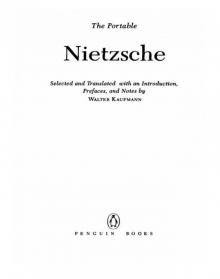 The Portable Nietzsche
The Portable Nietzsche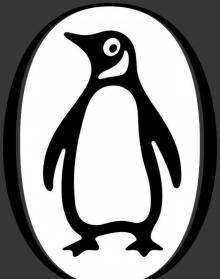 Twilight of the Idols/The Anti-Christ
Twilight of the Idols/The Anti-Christ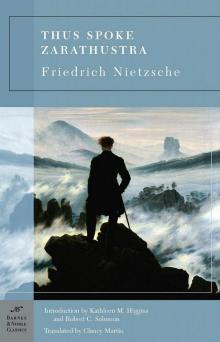 Thus Spoke Zarathustra
Thus Spoke Zarathustra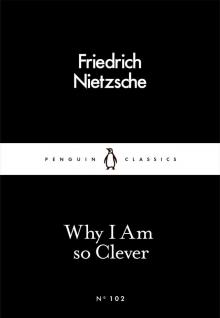 Why I Am So Clever
Why I Am So Clever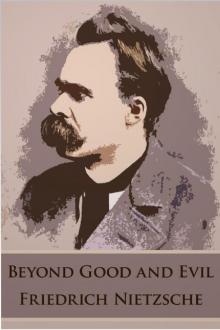 Beyond Good and Evil
Beyond Good and Evil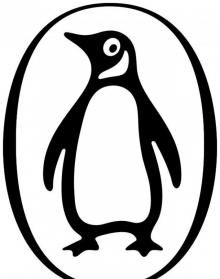 Twilight of Idols and Anti-Christ
Twilight of Idols and Anti-Christ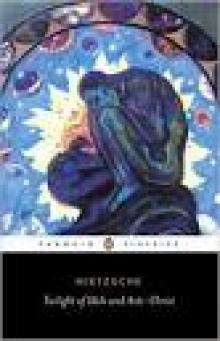 Twilight of Idols and Anti-Christ (Penguin Classics)
Twilight of Idols and Anti-Christ (Penguin Classics)